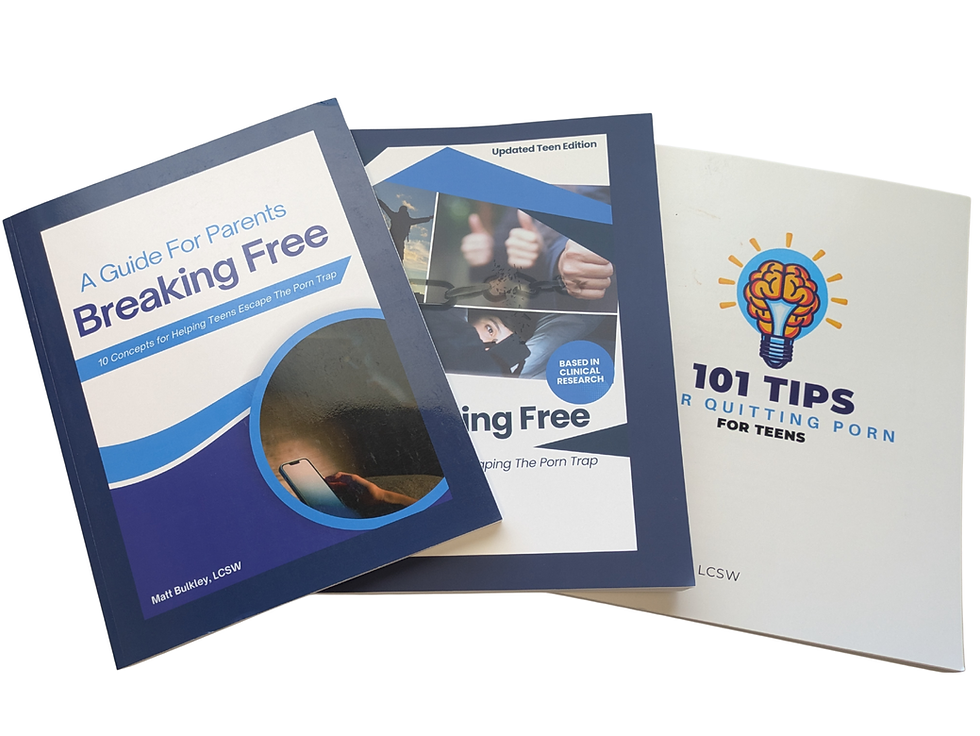Helping Your Teen Overcome Pornography Addiction: The Power of Music as a Healthy Distraction
- Matt Bulkley

- Jun 15
- 4 min read
Updated: Jun 18
As a parent, supporting your teen through a struggle with pornography addiction can feel like a daunting challenge. You want to help them find healthy ways to cope with urges and build a path to recovery. One surprisingly effective strategy is encouraging them to listen to their favorite music when cravings strike. This simple, science-backed tool can shift their focus, lift their mood, and reduce temptation. Here’s why music is a powerful ally in your teen’s recovery and how you can help them harness it, grounded in research and expert insights.
Why Music Helps Teens in Recovery
Pornography addiction often hooks teens by triggering dopamine, the brain’s “feel-good” chemical, creating a cycle of seeking instant gratification. Music offers a healthy alternative, engaging the brain in a positive way and helping your teen manage urges without guilt or shame. Here’s how it works and why it’s so effective:
Provides a Natural Dopamine Boost
A 2021 study in Frontiers in Psychology found that listening to music you love releases dopamine in the brain, mimicking the reward sensation that pornography provides but in a safe, sustainable way. When your teen cranks up their favorite playlist, their brain gets a natural “high” that can reduce the urge to seek out harmful content. This makes music a powerful tool for redirecting cravings toward something positive.
Reduces Stress and Temptation
Stress and emotional triggers often drive teens to pornography as a coping mechanism. According to a 2019 Journal of Behavioral Addictions study, music can lower stress levels and act as a distraction from tempting thoughts. By focusing on a favorite song or playlist, your teen can shift their attention away from urges, giving their willpower a chance to kick in. This distraction can be especially helpful during vulnerable moments, like late at night or when they’re feeling overwhelmed.
Supports Emotional Regulation
Therapists often recommend music as an “emotional regulation” strategy, as noted in a 2022 Psychology Today report on addiction recovery. Listening to music helps teens process emotions like anxiety, loneliness, or boredom without turning to unhealthy escapes. Whether it’s an upbeat track to lift their spirits or a calming melody to soothe stress, music provides a healthy outlet for managing feelings that might otherwise lead to relapse.
Builds Positive Habits
Incorporating music into moments of temptation can become a healthy habit over time. A 2020 Health Psychology study highlighted that engaging in enjoyable activities like listening to music can reinforce positive behaviors and reduce reliance on addictive ones. By turning to their favorite songs instead of screens, your teen can create a new go-to response when cravings arise, strengthening their recovery journey.
How to Encourage Your Teen to Use Music
Helping your teen tap into the power of music doesn’t require them to be a musician or have a specific taste in songs—it’s about finding what resonates with them. Here are practical ways to introduce music as a tool for their recovery:
Help Them Create a Go-To Playlist: Encourage your teen to build a playlist of songs that make them feel good, energized, or calm. It could include anything from pop hits to classical music or lo-fi beats. Suggest they turn to this playlist whenever they feel tempted or stressed, giving them an instant distraction.
Make Music Accessible: Ensure they have easy access to music, whether through a phone (with internet filters in place), a portable speaker, or even a non-internet-connected device like an MP3 player. This reduces the risk of stumbling onto triggering content while still allowing them to enjoy their tunes.
Explore Music’s Emotional Power Together: Talk with your teen about how certain songs make them feel. For example, ask, “What’s a song that always lifts your mood?” or “What music helps you relax?” This can spark a conversation about using music intentionally to manage tough moments.
Incorporate Music into Daily Life: Suggest listening to music during activities like studying, exercising, or winding down before bed. This helps normalize music as a positive habit, making it easier to turn to when cravings hit. For example, a calming playlist can be part of a screen-free bedtime routine.
Celebrate Their Efforts: Acknowledge when your teen uses music to cope with urges, even if it’s a small step. A simple, “I’m proud of you for choosing music to relax—that’s awesome!” can reinforce their progress and build confidence.
Supporting Your Teen’s Broader Recovery
Music is a fantastic tool, but it’s most effective when combined with other strategies. Foster open, non-judgmental conversations with your teen, letting them know you’re there to support them without shame. Professional counseling with a therapist experienced in addiction can help your teen address underlying triggers like stress or low self-esteem. Support groups or online communities can also provide encouragement, helping them feel connected and understood.
As a parent, your patience and empathy are crucial. Recovery from pornography addiction is a journey, and your teen may face setbacks. By encouraging music as a healthy distraction, you’re giving them a practical, enjoyable way to manage urges and build resilience.
A Step Toward Healing
Listening to music is more than just a fun pastime—it’s a science-backed strategy to help your teen combat pornography addiction. By providing a natural dopamine boost, reducing stress, and supporting emotional regulation, music can empower your teen to redirect their focus and stay on track. This simple habit can be a powerful ally in their recovery, helping them replace harmful behaviors with positive ones.
Start today—help your teen create a playlist they love, encourage them to turn to music during tough moments, and celebrate their efforts. With your support, they can harness the power of music to take control of their recovery and build a healthier, happier future.
Resources for Parents
Find guidance on supporting your teen in our Recovery Toolbox for Teens.










Comments